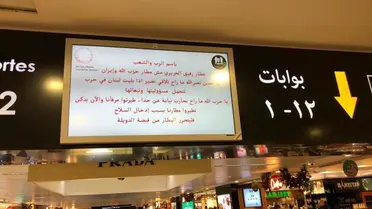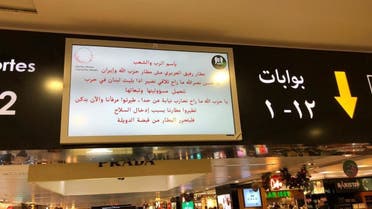Anti-Hezbollah messages replace screens at Beirut airport in cyber attack
Beirut airport on Sunday came under a cyber attack, Lebanon’s state news agency said, with footage shared by local media showing anti-Hezbollah messages had replaced screen displays at its terminal.
Hezbollah has exchanged near-daily cross-border fire with its arch foe Israel since war with Hamas broke out on October 7, with the Lebanese movement saying it was acting in support of its Palestinian ally in Gaza.
Media reports said the airport message urged the powerful Iran-backed group Hezbollah not to “drag the country into war”.
Lebanon’s National News Agency said “the cyber attack on the departure and arrival screens at the airport disrupted the BHS baggage inspection system.”
It added that authorities were working to restore the screens “and to maintain normal movement at the airport”.
Local media circulated images of the message criticising Hezbollah, displayed onscreen alongside the emblem of the Christian “Soldiers of God” group.
The group has declined to comment when contacted by AFP. It later released a video statement appearing to deny involvement in the cyberattack, describing it as “the work of the devil”.
The message said the airport was “not the airport of Hezbollah and Iran”, according to the reports.
“Hassan Nasrallah, no one will support you if you drag the country into war,” it added, addressing the group’s leader, also saying “we will not fight on behalf of anyone.”
The killing on Tuesday of Hamas’s deputy leader in Hezbollah’s southern Beirut stronghold, which a US defense official said was carried out by Israel, has raised fears of escalation.
“You’re going to blow up our airport by bringing in weapons. Let the airport be freed from the grip of the (Hezbollah) statelet,” the airport message said.
On Saturday, Hezbollah said it fired more than 60 rockets at an Israeli military base in response to the strike that killed Hamas’s number two, Saleh al-Arouri.
Hezbollah is the only Lebanese group to have held on to its weapons arsenal after the end of the country’s 1975-1990 civil war.
The “Soldiers of God” group is mostly known in Lebanon for its hardline stances and attacks against the country’s LGBTQ community.
On Saturday, the European Union’s foreign policy chief Josep Borrell met a Hezbollah political official in Beirut, as part of a push to avoid Lebanon being dragged into the Israel-Hamas war, an EU source said.
Nearly three months of cross-border fire have killed more than 180 people in Lebanon, including 135 Hezbollah fighters, but also more than 20 civilians including three journalists, according to an AFP tally.
In northern Israel, nine soldiers and at least four civilians have been killed, according to Israeli authorities.


